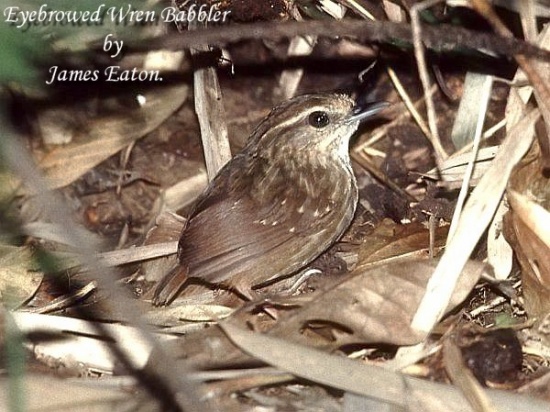Small Wren-Babbler; Lesser Wren-Babbler; Streak-breasted Wren-Babbler; Austen's Small Wren-Babbler (roberti); Grant's Wren-Babbler (guttaticollis)
- Napothera epilepidota
Identification
10 - 11cm. A small, almost tailless babbler:
- Grey-brown above with dark scales
- Prominent long pale supercilium
- Large whitish spots on tips of greater and median secondary coverts
- Long, thin bill
- Dark brown ear-coverts
- White throat, whitish breast and belly with buff streaks (guttaticollis with bold blackish spots on throat)
Distribution
Found from southeast Bhutan and northeast India east to Burma, Thailand, Indochina, south China (Yunnan to Guangxi). peninsular Malaysia, Sumatra, Borneo and Java.
Fairly common in its range, although rare in India and only one record from Bhutan in 1939)
Taxonomy
There are 13 subspecies:
- N. e. guttaticollis in northeast India (and probably Bhutan)
- N. e. roberti in northeast India (south of Brahmaputra) and northwest Burma
- N. e. bakeri in Burma (maybe better merged with davisoni)
- N. e. davisoni in Thailand and south Burma
- N. e. amyae in south China and Vietnam
- N. e. laotiana in Laos
- N. e. delacouri in east-central Guangxi (Yao Shan), China
- N. e. hainana on Hainan Island, China
- N. e. clara in south Annam, Vietnam
- N. e. granti in extrem south Burma, south Thailand and peninsular Malaysia
- N. e. diluta in Sumatra, Indonesia
- N. e. exsul in Borneo
- N. e. epilepidota in Java
Habitat
Broadleaf evergreen forest, secondary forest. Prefers areas with streams, mossy boulders, old stumps). Found at 900 - 1800m in Java, 450 - 2000m in Sumatra, 50 - 2135m in southeast Asia and China and 300 - 1800m in India.
Behaviour
Feeds on insects and spiders.
Usually seen in pairs or family groups on the ground or in the understorey. Difficult to see, skulking.
Breeding season January to June on mainland Asia, November to December on Java. The nest is a cup, semi-dome or dome made of dead material (similar to Streaked Wren-Babbler) and placed against a boulder or steep bank, generally on or near the ground. Lays 2 - 5 eggs.
Resident species.
References
- Clements, JF. 2008. The Clements Checklist of Birds of the World. 6th ed., with updates to December 2008. Ithaca: Cornell Univ. Press. ISBN 978-0801445019.
- Del Hoyo, J, A Elliott, and D Christie, eds. 2007. Handbook of the Birds of the World. Volume 12: Picathartes to Tits and Chickadees. Barcelona: Lynx Edicions. ISBN 978-8496553422
- Rasmussen, PC and JC Anderton. 2005. Birds of South Asia: The Ripley Guide. Barcelona: Lynx Edicions. ISBN 978-8487334672
Recommended Citation
- BirdForum Opus contributors. (2024) Eyebrowed Wren-Babbler. In: BirdForum, the forum for wild birds and birding. Retrieved 15 May 2024 from https://www.birdforum.net/opus/Eyebrowed_Wren-Babbler




